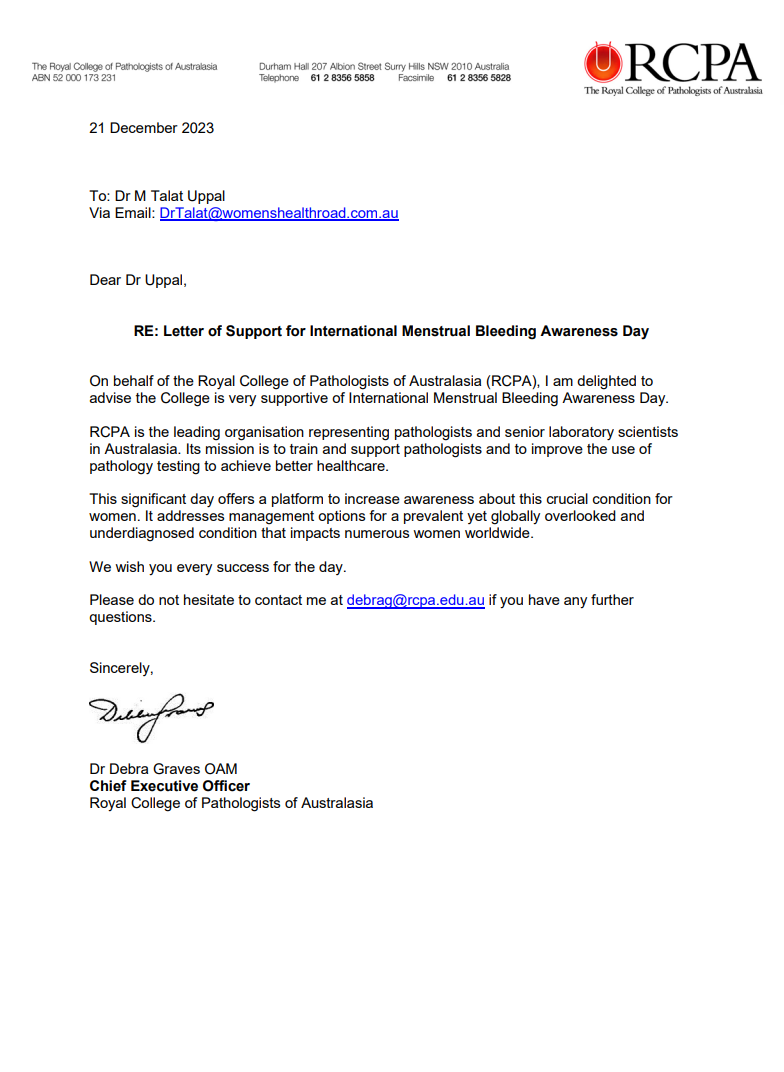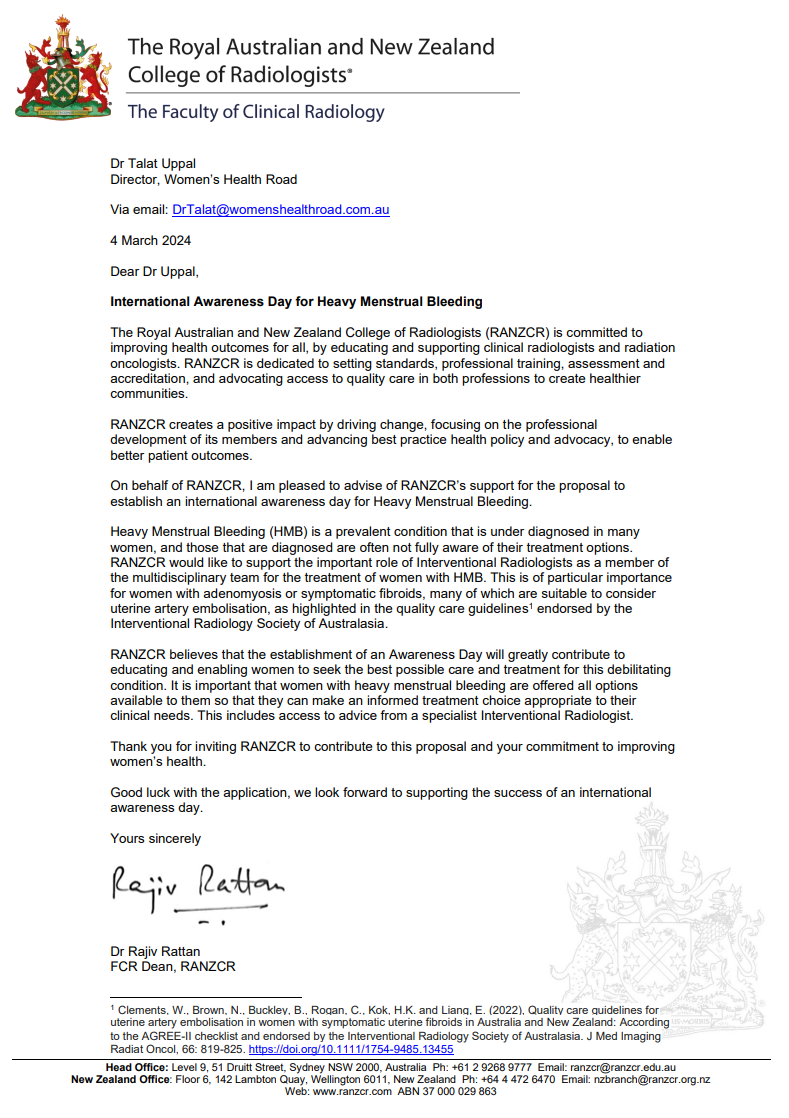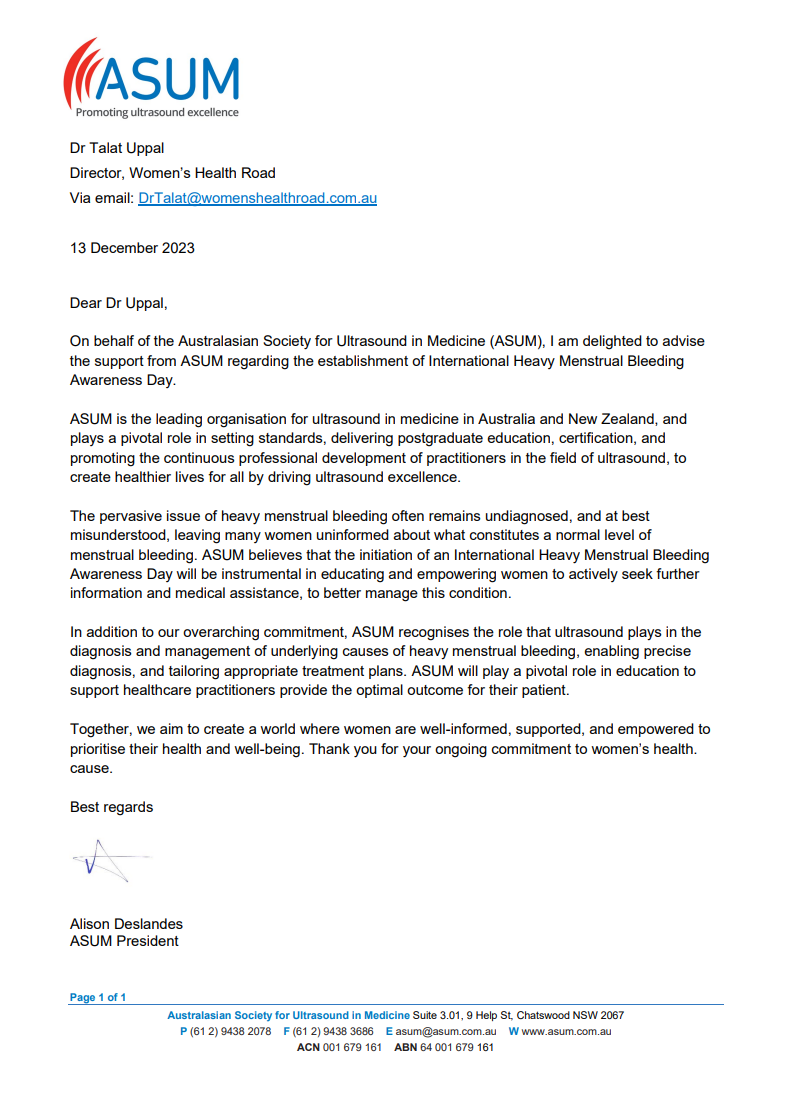Supporters
Associate Professor Ally Murji - FIGO Committee On Menstrual Disorders, Division Head Minimally Invasive Gynecologic Surgery University of Toronto, Advanced Pelvic Surgeon & Obstetrician, Mount Sinai Hospital
Dr Megan Young - GP Specialist with a special interest in Menopause Management
“Heavy menstrual bleeding (HMB) affects approximately 1 in 4 women worldwide, presenting a significant public health concern. Despite this, awareness is lacking amongst both patients and health care providers, leaving many people with HMB inadequately treated, and at risk of iron deficiency anaemia, and possibly even uninvestigated malignancy. GPs are usually the first point of care with HMB and HMB and related iron deficiency are common presentations within general practice. The BEACH data shows that heavy menstrual bleeding accounted for more that 8 per 1000 general practice presentations between 2012 and 2016.[1] Most heavy menstrual bleeding can be assessed and managed within a primary care setting. IMHB is a valuable opportunity to raise awareness of primary care management of HMB, for both health care providers and patients. ”
https://www1.racgp.org.au/ajgp/2021/august/management-of-heavy-menstrual-bleeding-in-australia.
Professor Deborah Bateson - Professor of Practice, The Daffodil Centre, Faculty of Medicine and HealthCo-Lead, Cervical Cancer and HPV Stream: Clinical translation and Implementation
“This is a common problem and as a clinical champion for breaking the taboos and shame around periods I know there is a lot we can do for women with HMB. I encourage everyone to seek timely care and see their GP if they have concerns that their periods may be heavier than normal and are interfering with their daily life.”
Dr Lucy Burns - GP and Lifestyle Medicine Physician
“As medical doctor and lifestyle medicine physician, I help women going through menopause get off the diet rollercoaster and improve their health with holistic lifestyle changes. It is my honour to support the Bleed Better project. Heavy menstrual bleeding is a common problem for the women I see. The combination of evidence based lifestyle changes with appropriate medication is the key to improving health and well being for women.”
Dr Tanushree Rao - Gynaecologist And Advanced Laparoscopic Surgeon
Dr Kristen Hamilton
“We have many effective medications available for heavy menstrual bleeding, but they are being under-utilised in general practice. Oral hormonal medications (such as the oral contraceptive pill) are prescribed most often,1 despite the levonorgestrel intrauterine system and tranexamic acid being more effective in a recent Cochrane systematic review.2 We need to ask women about their periods, and offer them the best options for their heavy bleeding in a patient centred manner.”
1. Ashworth G, Bateson D, Britt H, McGeechan K, Harrison C. Management of heavy menstrual bleeding in Australian general practice: An analysis of BEACH data. Australian journal of general practice. 2021;50(8):573-579. doi:10.31128/AJGP-08-20-5570.
2. Bofill Rodriguez M, Dias S, Jordan V, et al. Interventions for heavy menstrual bleeding; overview of Cochrane reviews and network meta‐analysis. Cochrane database of systematic reviews. 2022;2023(2):CD013180-CD013180. doi:10.1002/14651858.CD013180.pub2
Dr Ghalia M. Abumohsen
“As a family physician working with patients from all ages, I realized that most females with heavy menstrual bleeding try to avoid discussing the problem as a chief complaint. Particularly the adolescents, who usually present with the signs and symptoms of iron deficiency. These patient’s really need our help to increase their awareness about what is normal, what is not, what tests should be done and how to manage such a common condition in an effort to improve their quality of life.”
Dr. Angela Kwong - NSW State Lead - Royal Australian College of General Practitioners Specific Interests in Obesity Management
“As a General Practitioner with a special interest in medically supervised weight loss, it is a pleasure to be supporting Bleed Better with educational resources for both Clinicians and Patients, to better understand the relationship between weight and heavy menstrual bleeding.
During the process of the investigation and management of heavy menstrual bleeding, weight management can be the furthest from the mind, yet can play a central role in disease management, and also contribute to their overall health and wellbeing.
Understanding this link can be incredibly empowering, and allow conversations to start between patients and clinicians so that shared decision making and planning can begin.”
Alison Deslandes - President, Australian Society for Ultrasound Medicine
Dr Devora Lieberman - Medical Director, City Fertility NSW
Dr Preetham Ganu - Obstetrician and Gynaecologist
Dr Geetha Venkatram - Council Member, RACGP
Dr Hina Jawaid - Family Doctor
Dr Fernando Infante - Obstetrician and Gynaecologist
Dr Ceri Cashell - General Practitioner with a special interest in women’s health
Letters of Support
















